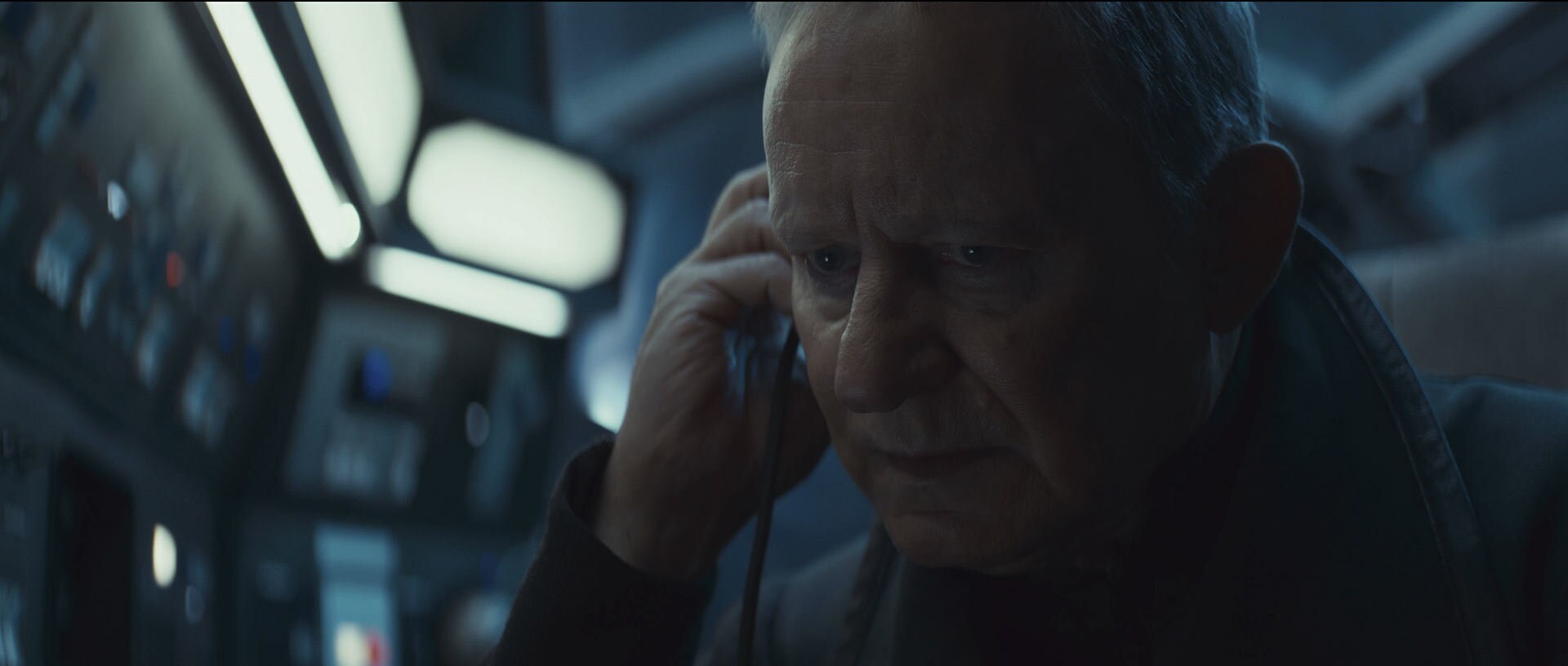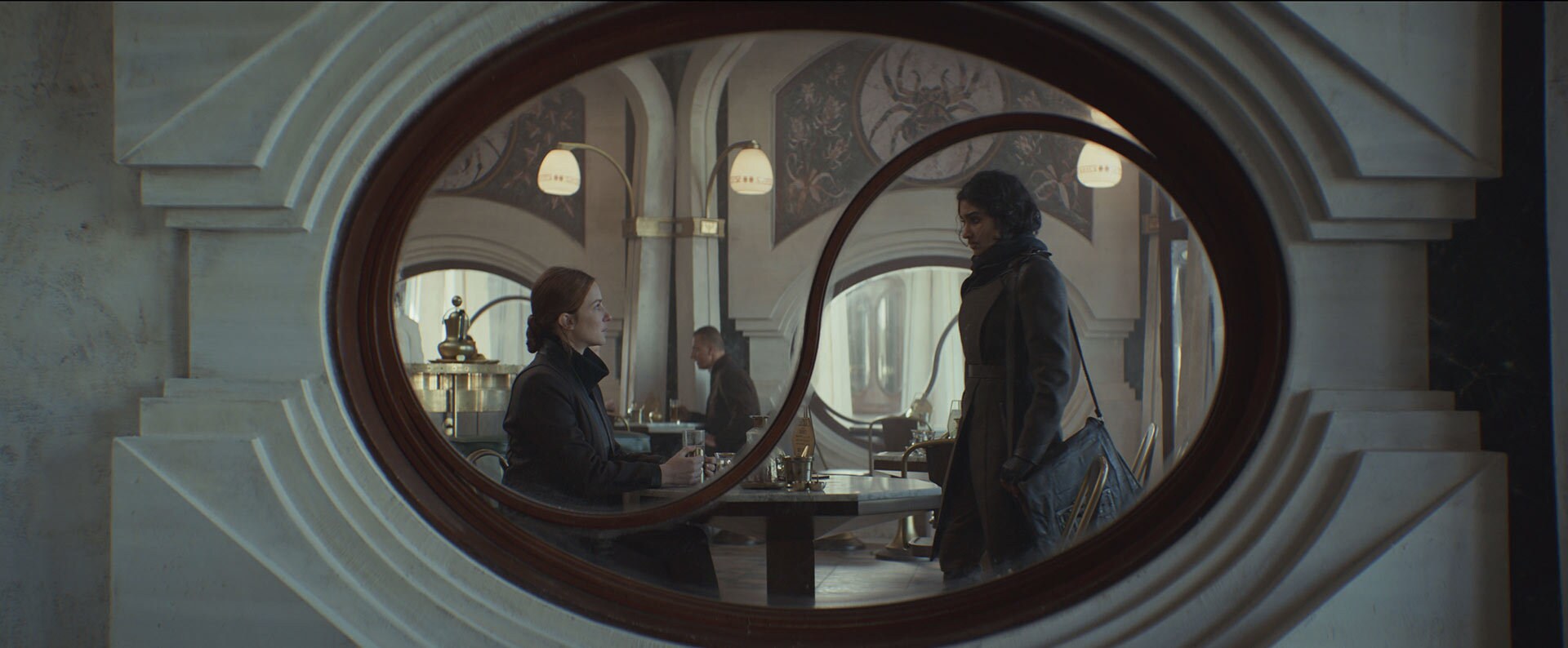Episode six, “What a Festive Evening” marks the end of the second small arc out of four. The next arc is, arguably, the most important of the show and a high point in U.S. television. While this episode does not contain the gravitas of the next three episodes, it still has an important job of showcasing that Luthen’s ability as a leader is rarely rooted in kindness or empathy.
Luthen picks up Cassian still disguised as a fashion designer after his interview with the Ghorman Front, but he’s surprised and disappointed when Cassian says to not be involved: “They started too late, now they’re rushing.” Luthen pushes back, which leads to one of the great exchanges that starts to shift Cassian’s thinking:
Cassian: “I’m thinking like a soldier.”
Luthen: “Think like a leader.”
With Luthen, Cassian obeys orders. He doesn’t think beyond that. He goes where he’s told and completes missions with great success. In order to become the Cassian of Rogue One, though, that will have to change. In season one, Cassian goes from a-political thief to becoming part of Luthen’s team determined to defeat the Empire at any cost. In season two, he needs to become the leader able to inspire a group of rebels to sacrifice themselves to deliver the Death Star plans. This exchange with Luthen begins to mark that change in Cassian.
But, Luthen doesn’t listen to Cassian. On Ghorman, Vel (Faye Marsay) has now arrived, unbeknownst to Cassian. She’ll be working with her former lover from the Aldhani heist, Cinta (Varada Sethu). Vel told Luthen she’d only take the job if Cinta were on it. Their love rekindles, and they both realize that it is Luthen keeping them apart. Much like Luthen’s meddling with Cassian and Bix’s relationship, Vel says that she and Cinta are worth more to him apart than together. To Luthen, they are tools in his mission to destroy the Empire at any cost—not to support them as full human beings.
Together, Vel and Cinta try to teach the untested Ghorman Front how to run an operation. While the Ghormans chafe under their orders, they agree to work together and do as they’re told, including remaining unarmed. At first, the heist to steal the secret imperial weapons—organized by Syril to trap the Ghorman—goes smoothly, until one of the Ghorman, Lezine from the townhall, arrives and wants to know what’s going on. Another Ghorman pulls a gun on him, a struggle ensues, and ultimately Cassian’s prediction comes true. They weren’t ready. They didn’t follow orders and brought a gun when only Vel and Cinta were supposed to be armed.
The gun goes off—and Cinta dies.
As they escape with Lezine carrying Cinta’s body and Vel struggling to contain her emotions, she says one of the great lines of season two. To the young rebel who accidentally shot Cinta and is now breaking down into tears, she says: “This is on you now. This is like skin.”
Meanwhile, Luthen and Kleya have their own problems as a listening device they planted in an antique in Davo Sculden’s home is about to be discovered. They get dressed up and party with the Imperial officers and politicians, including Mon Mothma and Director Orson Krennic. In one of the standout performances of the episode, Kleya must sneakily remove the bug right in front of Krennic. Much like this whole three-episode arc, this party sequence leans into Tony Gilroy’s previous work on spy films. As the tension rises, though, we also get to see two incredible actors traded barbs from opposite sides of the aisle as Mothma needles Krennic. She greets him immediately with: “How pleasant to see you free of the witness stand,” which prompts the snarky back and forth.
While Mothma is unaware that Kleya is trying to remove a listening device, the rising tension between her and Krennic is the perfect cover for Kleya, leading to one of Krennic’s great lines: “My rebel is your terrorist, something like that.” Of course, this is the great irony of watching any Star Wars property in the twenty-first century. The actions the “good guy” rebels take are what the U.S. government would label as acts of terrorism (this is especially clear in Rogue One where Saw Gerrera’s forces are dressed to look West Asian). While many commentators have made this connection between rebel/terrorist in the past, Andor including it so openly in the dialogue continues to build the antifascist narrative as clearly as possible.
The episode ends on two high notes. As Luthen and Kleya walk out, they joke that they should have offed Krennic at the party, which, considering all the pain that Krennic and his Death Star cause, is a darkly funny moment. Additionally, the episode ends with a delightful moment of revenge. Luthen sends Bix on a mission to kill the man who tortured her. We learn earlier in the episode that his method of torture was so successful that the Emperor wanted to expand it—but Bix gets there first. She puts him in the chair and leaves him to the same torture he put her through. On the way out, Cassian blows up the building as they walk away in an epic shot. One of my favorite small details about that moment is, on the soundtrack, Nicholas Britell titled that track “The Bix Is Back.”
While this trilogy of episodes doesn’t end on the high note of “Harvest” in the first arc, it does set up the viewer for some of the best television I’ve seen in years—perhaps some of the best storytelling Star Wars has to offer. Importantly, we see Luthen beginning to crack. While he’s been effective in building the rebellion in the early stages, as it continues to grow and face opposition, he and Kleya struggle, even leading him to say to her: “We’re drowning.” He’s never been the comforting type to Cassian or Bix, but as he struggles to defeat the Empire at any cost, the people under him suffer.
But even so, the rebellion is growing and spreading….
POSTED BY: Phoebe Wagner (she/they) is an author, editor, and academic writing and living at the intersection of speculative fiction and environmentalism.

